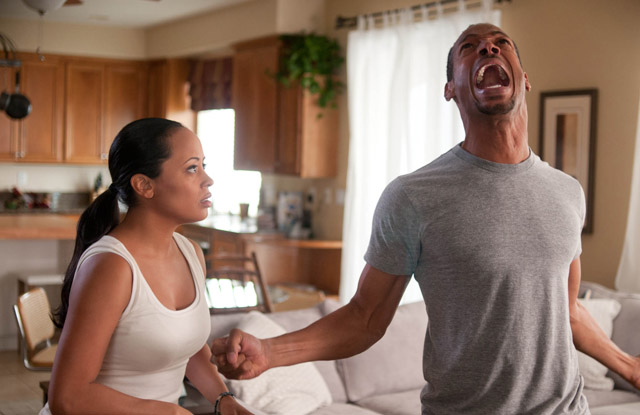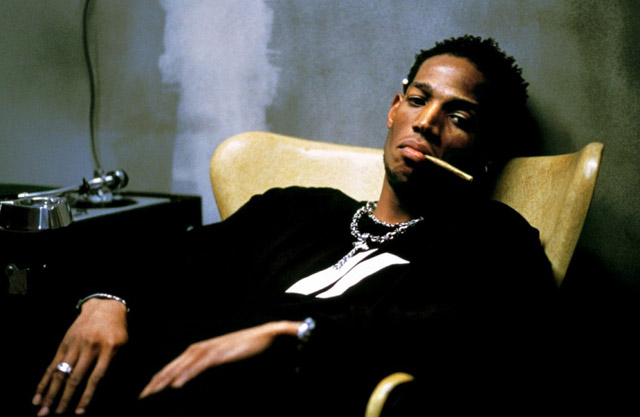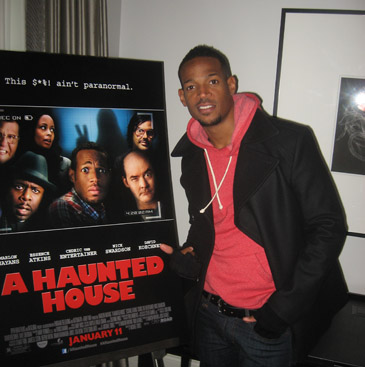CHICAGO – In anticipation of the scariest week of the year, HollywoodChicago.com launches its 2024 Movie Gifts series, which will suggest DVDs and collections for holiday giving.
Interview: Marlon Wayans Chases Spoofs in ‘A Haunted House’
CHICAGO – When it comes to the art of spoofing the current movie culture, few have done it with more success than Marlon Wayans. As a sibling member of the Wayans Brothers, he has spent his career doing take-offs in films such as the “Scary Movie” franchise, “Dance Flick” and his current spooky satire, ‘A Haunted House.’
Marlon Wayans is the youngest of the Wayans comedy clan, which includes Keenan Ivory, Shawn, Damon and Kim. After attending LaGuardia High School of the Performing Arts and Howard University, he joined his rising star siblings in the family business of comedy. After appearing in the film “Mo’ Money” (1992) – written by brother Damon – he joined the cast of FOX TV’s “In Living Color” (1990-94) produced by Keenen Ivory and Damon. He morphed from there to “The Wayans Bros” (1995-99), a sitcom on The WB. In 2000, he took a dramatic turn with a notable role in “Requiem for a Dream,” portraying the junkie Tyrone C. Love.
 Photo credit: Open Road Films |
In the rest of the 2000s, Marlon Wayans was involved – as writer and performer – in the hugely successful “Scary Movie” franchise, which was the granddaddy of movie satires. He continued by participating in a string of Wayans hits, including “White Chicks” (2004), “Little Man” (2006) and “Dance Flick” (2009). “A Haunted House” is his 20th film, and he co-wrote the script and plays the lead character Malcolm.
Marlon Wayans sat down with HollywoodChicago.com to talk about his particular spin on the art of the movie spoof, and his prosperous career.
HollywoodChicago.com: You’ve been in the movie satire business for most of your career. What is the key, in your opinion, to good satire?
Marlon Wayans: I think it has to start in truth, and you have to strike a chord within that truth, to make it relatable to everybody, not just those people who have seen the movie. It’s got to have a good story, with fun characters and it has to have a purpose as a movie. I’m a disciple of the Keenen Ivory Wayans School of Comedy, and he taught me to make sure that it’s multi-layered.
In terms of good satire, ‘A Haunted House’ is not desperate parody. What we tried to do with this movie is a hard comedy with parody moments. The theme is basically “Paranormal Activity” if it happened to a black couple. Everybody talks about that point of view, but to actually see it is a lot of fun.
HollywoodChicago.com: You put the actress Essence Atkins through a wide range of situations involving her character. What quality did she have in the auditions that made her the ideal choice for all that she had to do in the movie?
Wayans: At first, we were in talks with somebody else to play the role. That girl was timid, and it made us cautious. When Essence came in, she had just had a baby five weeks before, and she was just ‘whatever you need, however you need it, I’m doing it.’ She said she’d just gone through labor, so our little movie was nothing. [laughs] She was game.
HollywoodChicago.com: Why do you think people love horror films so much, and how do you look to exploit that love for humor in movies like ‘A Haunted House’ and the ‘Scary Movie’ franchise?
Wayans: People like to be scared, people are crazy. [laughs] We as a society just love to be scared, I don’t get it. It’s not stuff you’d normally be involved in, but maybe we just think it might happen to us. Freddy Kruger and the ‘Nightmare on Elm Street’ movies are scary as hell, because we all sleep.
Why movies in general are so fun to go to is that you get to experience an emotion of some kind, simultaneously with other people you don’t know, sharing that experience with you. Horror and comedy share the same set-ups. Horror is tension, tension, tension – then scary release. Comedy is tension, then a release in the joke. They are similar, so it’s easy to marry the two.
HollywoodChicago.com: Obviously, being in a family with nine siblings, and having some folks ahead of you getting in the comedy business, will help determine a person’s career. But what is your personal connection in wanting to be a comedian?
Wayans: I’ve wanted to do comedy since I was about five years old. My brother Shawn and I grew up watching Abbott & Costello, Jackie Gleason, “I Love Lucy,” Charlie Chaplin, Laurel & Hardy and most importantly Bugs Bunny and Daffy Duck. Those Looney Tunes was the origin of our comedy – they were funny, edgy, smart – they did satire, they were political. The Looney Tunes of old were great comedy, and that’s really why I wanted to do it.
I love the feeling I get when I see people laugh. I don’t want my movies to change your life, I want my movies to change your mood. I just want you to go have fun.
HollywoodChicago.com: You grew up in an urban environment, and have done tons of satire on the people you knew in that neighborhood. What kind of hustle did you observe that make those characters funny?
Wayans: It is both in the truth of them, and the contradiction of them. The gangsters who are scared are always hilarious. They have that false bravado – they want to shoot this or that, but when they hear a ghost, they run off. That’s funny. That’s what my brothers and I did, when we looked at the people in our neighborhood and ourselves, we looked for the ‘this,’ but also the ‘that.’ It is the contradiction that make people funny.
 Photo credit: Artisan Entertainment |
HollywoodChicago.com: You got a lot of your boot camp in comedy doing television. What did the shows ‘In Living Color’ and ‘The Wayans Bros.’ teach you about creating situations that make people laugh?
Wayans: Television teaches you how to learn a script in a week, and it constantly changes. Then you basically put on a play every week in front of people, and cameras are there, so you have no choice but to make them laugh with that ever-changing material. I’ve been doing stand-up comedy for two years now and it’s similar. You know your set, but in dealing with live audiences you become a better writer, because you hear the laughs and you know where the laughs are. They both taught me about that ‘audience inside my head.’ That’s why the type of TV I did and stand-up is special to me.
HollywoodChicago.com: You made an auspicious dramatic debut in the 2000 film ‘Requiem for a Dream.’ How did you and Darren Aronofsky develop the character of Tyrone, and what scene scared you the most as far as your challenge as an actor?
Wayans: I auditioned for ‘Requiem for a Dream’ five times, it was not given to me. Darren didn’t see someone on ‘the frog network’ [The WB] in his movie at the time. But I kept coming in and I kept impressing him. I have a background in theater from my performing arts high school, I just don’t get a chance to showcase that side of me, because that’s not what I’m known for.
To prepare for Tyrone once I landed the role, I slept on the floor of my house, prepared a drug kit as a prop, didn’t wash for several days, wore the same clothes and started smoking, even though I’d never smoked before. I went for it. With Darren he had me understand how he was going to shoot it, and what kind of world he was preparing for the character.
HollywoodChicago.com: Did you and Darren ever clash on the interpretation of the character?
Wayans: I had a problem with the way Tyrone spoke, it was too 1970s for me. I told Darren it sounded like an old white guy wrote it back in the ‘What’s Happening’ days. Darren told me to make it cool, so I studied the language from the original book that Hubert Selby wrote, combined it with his screenplay adaptation, and took it to the generation we shot it in, which was the year 2000.
HollywoodChicago.com: The use of the n-word is still a constant in black oriented culture and comedy. What is your opinion of the use of the word, both inside and outside the culture?
 Photo credit: Patrick McDonald for HollywoodChicago.com |
Wayans: I have a crazy point-of-view of life in general, I don’t get hung up on words. As far as the n-word is concerned, it’s not about the denotation, it’s about the connotation. What does somebody mean about what is said? You can say any word, and it can become highly offensive, depending on the way that you say it in certain situations. I can ‘f**k you’ in a million different ways, and you can be offended by it or even laugh with it. There are so many different ways of interpretation – what did you mean by the word and how do you say it?
HollywoodChicago.com: What do you say to your kids about that context?
Wayans: I use the word, and they actually tell me not to use it. They are in a different generation, and they don’t see color. White kids are listening to hip-hop, black kids are skateboarding. My kid’s generation is finishing what my generation in the 1980s started, not seeing color in the world.
HollywoodChicago.com: What do you think is the disadvantage of your how your kids view the world, considering their advantage in the privileges that you never had?
Wayans: They will come up against situations, for example with employers from another generation, where they might be treated differently and they might not know why. Because of their circumstances they are ignorant of that, and a bit more aloof. I don’t want to prepare them for that, but the sad part is I have to. There is racism out there, and they may come across it, but I always tell them to never let that break them down.
HollywoodChicago.com: You have been attached to a Richard Pryor biography project for several years, and heard you sent in a legendary audition tape. What is the status of the project, where is it going and is it going to be made?
Wayans: Right now it’s lying dormant, I wish it would happen and I hope that it happens. It’s a beautiful story, and the screen test I put together with Bill Condon [screenwriter and director for ‘Dreamgirls’] was awesome. He’s a great director, and what we were able to capture in just a week was special. But I think if I had more time to prepare – because now I’m actually doing stand-up comedy – I would create more understanding about the journey of Pryor’s life as a comic, because stand-up is the best method acting you can possibly do. In combination with the script, I can help the director with that journey.
Pryor had a lot of darkness in him, but there was that vulnerability in him. There was something in him that made all those women fall in love with him, and the world to fall in love with him. There was something beautifully innocent in him, even though there was decadence in his life. I hope to one day do that movie.
 | By PATRICK McDONALD |


